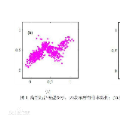In this work we address the problem of transferring knowledge obtained from a vast annotated source domain to a low labeled target domain. We propose Adversarial Variational Domain Adaptation (AVDA), a semi-supervised domain adaptation method based on deep variational embedded representations. We use approximate inference and domain adversarial methods to map samples from source and target domains into an aligned class-dependent embedding defined as a Gaussian Mixture Model. AVDA works as a classifier and considers a generative model that helps this classification. We used digits dataset for experimentation. Our results show that on a semi-supervised few-shot scenario our model outperforms previous methods in most of the adaptation tasks, even using a fewer number of labeled samples per class on target domain.
翻译:在这项工作中,我们处理从庞大的注解源域向低标签目标域转移知识的问题。我们建议采用半监督的域适应法(AVDA),这是一种基于深度变异内嵌图的半监督域适应方法。我们使用近似推论和域对称方法,将源和目标域的样品绘制成一个统一的、以等级为主的嵌入层,定义为Gaussian Mixture模型。AVDA作为一个分类师工作,考虑一种有助于这一分类的基因化模型。我们用数字数据集进行实验。我们的结果显示,在半监督的几发假设中,我们的模型在大多数适应任务中都比以往的方法差,甚至在目标域使用较少的每类标签样本。





